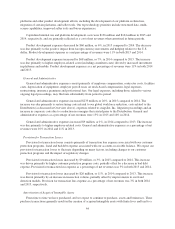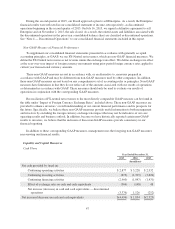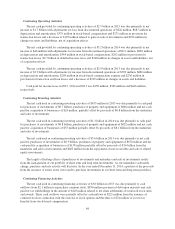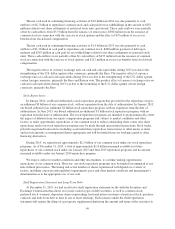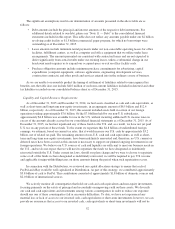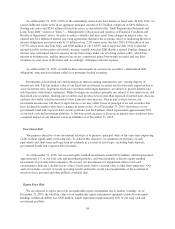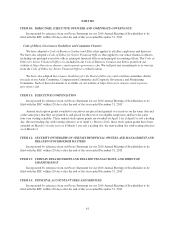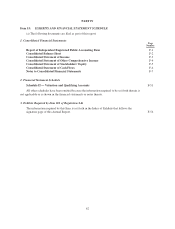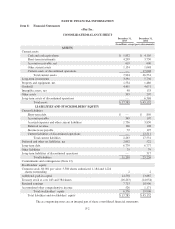eBay 2015 Annual Report Download - page 66
Download and view the complete annual report
Please find page 66 of the 2015 eBay annual report below. You can navigate through the pages in the report by either clicking on the pages listed below, or by using the keyword search tool below to find specific information within the annual report.apparent from other sources. Our senior management has discussed the development, selection and disclosure of
these estimates with the Audit Committee of our Board of Directors. Actual results may differ from these
estimates under different assumptions or conditions.
An accounting policy is considered to be critical if it requires an accounting estimate to be made based on
assumptions about matters that are highly uncertain at the time the estimate is made, and if different estimates
that reasonably could have been used, or changes in the accounting estimates that are reasonably likely to occur
periodically, could materially impact the consolidated financial statements. We believe the following critical
accounting policies reflect the more significant estimates and assumptions used in the preparation of our
consolidated financial statements. The following descriptions of critical accounting policies, judgments and
estimates should be read in conjunction with our consolidated financial statements and related notes and other
disclosures included in this report.
Revenue Recognition
We may enter into certain revenue transactions, primarily related to certain advertising contracts, that are
considered multiple element arrangements (arrangements with more than one deliverable). We also may enter
into arrangements to purchase goods and/or services from certain customers. As a result, significant
interpretation and judgment is sometimes required to determine the appropriate accounting for these transactions
including: (1) how the arrangement consideration should be allocated among potential multiple deliverables;
(2) developing an estimate of the stand-alone selling price of each deliverable; (3) whether revenue should be
reported gross (as eBay is acting as a principal), or net (as eBay is acting as an agent); (4) when we provide cash
consideration to our customers, determining whether we are receiving an identifiable benefit that is separable
from the customer’s purchase of our products and/or services and for which we can reasonably estimate fair
value; and (5) whether the arrangement would be characterized as revenue or reimbursement of costs incurred.
Changes in judgments with respect to these assumptions and estimates could impact the timing or amount of
revenue recognition.
Accounting for Income Taxes
Our annual tax rate is based on our income, statutory tax rates and tax planning opportunities available to us
in the various jurisdictions in which we operate. Tax laws are complex and subject to different interpretations by
the taxpayer and respective government taxing authorities. Significant judgment is required in determining our
tax expense and in evaluating our tax positions, including evaluating uncertainties. We review our tax positions
quarterly and adjust the balances as new information becomes available. Our income tax rate is significantly
affected by the tax rates that apply to our foreign earnings. In addition to local country tax laws and regulations,
our income tax rate depends on the extent that our earnings are indefinitely reinvested outside the U.S. Indefinite
reinvestment is determined by management’s judgment about and intentions concerning our future operations. At
December 31, 2015, $6.0 billion of earnings had been indefinitely reinvested outside the U.S., primarily in active
non-U.S. business operations. We do not intend to repatriate these earnings to fund U.S. operations and,
accordingly, we do not provide for U.S. federal income and foreign withholding tax on these earnings.
Deferred tax assets represent amounts available to reduce income taxes payable on taxable income in future
years. Such assets arise because of temporary differences between the financial reporting and tax bases of assets
and liabilities, as well as from net operating loss and tax credit carryforwards. We evaluate the recoverability of
these future tax deductions and credits by assessing the adequacy of future expected taxable income from all
sources, including reversal of taxable temporary differences, forecasted operating earnings and available tax
planning strategies. These sources of income rely heavily on estimates that are based on a number of factors,
including our historical experience and short-range and long-range business forecasts. At December 31, 2015, we
had a valuation allowance on certain loss carryforwards based on our assessment that it is more likely than not
that the deferred tax asset will not be realized.
54


